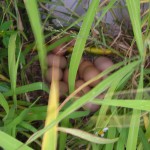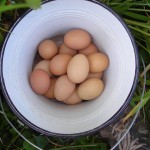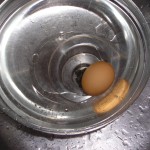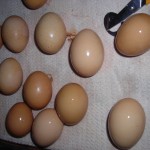My four adult chickens have been giving us an average of 3.75 eggs a day for the last month or so, which is the normal rate for roughly March until about September. About two weeks ago, I noticed the egg production was tapering off, with one or two eggs a day becoming routine. Being early in the year still, I wasn’t phased until it became a single egg for several days in a row.
The chickens have either gone rouge in their laying patterns or they were moulting.
Moulting is a time when a bird replace a large amount of feathers and tend to stop laying as their bodies adjust. Moulting is similar to a snake shedding its skin, making the animal in the process jumpy, touchy, or otherwise not their usual selves.However, in chickens, it usually happens later in the summer, sometimes pushing into autumn. April is far too early, particularly for all of them to have it happen at the same time….
So today I went out to check for eggs, found two, and decided it was time to go egg hunting. Since I free-range my birds, they could find a hidden spot anywhere in my yard, and I’d walk right by it never knowing. I was hoping it was in the yard, as some days the birds jump the fence and wander around the neighborhood. If they went our of the yard to lay eggs,I’d never find them.
There are only a few spots in the yard with enough cover to hide a nest, thankfully, so I carefully went through each possibility leaving no leaf unturned. Not in the fig tree leaf litter. Nothing under the fence row hedge. Not behind the much hay. And nothing under the hurricane shutter stack. The only other option was the tall grass growing (yes out of control, I hate mowing) over the septic tank and drain field.
Here is what I saw:
I found 15 eggs sitting in the grass. How long had  they been there? Since they were all piled up in a nest, would they hatch? Were they edible? Why is there braille instructions on a drive up ATM? I can answer the first three…
they been there? Since they were all piled up in a nest, would they hatch? Were they edible? Why is there braille instructions on a drive up ATM? I can answer the first three…
Since I collect eggs daily, and I noticed a drop off about two weeks ago, they were probably no older than two weeks old.
I do not have any roosters, therefore none of my chicken eggs are fertile, so will never  hatch. Also, there was no chicken sitting on the eggs, being what is called “broody”. A broody hen has the instinct to sit patiently for 21 days in order to turn eggs into baby chickens. Most chicken breed known for the ability to lay LOTS of eggs have had most of the broody nature bred out of them, since a chicken stops laying eggs when it is sitting in a nest. My adult hens are all egg-laying breeds, and all have been seen every day, so none were hiding out on a nest. Not only will these eggs never hatch, no hen had been sitting on them regularly enough to have accomplished it either. No hatching for these eggs either way.
hatch. Also, there was no chicken sitting on the eggs, being what is called “broody”. A broody hen has the instinct to sit patiently for 21 days in order to turn eggs into baby chickens. Most chicken breed known for the ability to lay LOTS of eggs have had most of the broody nature bred out of them, since a chicken stops laying eggs when it is sitting in a nest. My adult hens are all egg-laying breeds, and all have been seen every day, so none were hiding out on a nest. Not only will these eggs never hatch, no hen had been sitting on them regularly enough to have accomplished it either. No hatching for these eggs either way.
Were they edible? This is the $64 dollar question.
Refrigeration is a relatively new method of preserving, so how did our grandmothers handle egg preservation? From a Mother Earth News study:
An egg that is not subjected to some form of preservation, whether refrigeration or one of the room-temperature methods listed in the link above, can last fresh longer than you may think. One of the important determinants of longevity is whether the egg has been washed or not. Eggs are coated with a natural “bloom” which protects them against air and bacteria. In nature, this is to allow the eggs to develop into chicks successfully. Washing the egg strips it of its natural bloom and leaves it vulnerable to the elements. The Mother Earth News study found that homestead eggs that retained their natural bloom stayed fresh for more than three months on average without refrigeration although the quality and texture began to decline after about two months. Commercial eggs that had been washed lasted a far shorter time.
What does this mean? Being two weeks old or younger, these eggs are probably safe to eat. But how do I know? Is there a test?
Yes, there is!
- Simply fill a bowl with cold water, a deep as 3-4 egg widths.

- Gently place the egg into the bowl.
- If it sinks, resting on its side, its in great shape, eat it.
- If it floats to the top, toss it, preferably far away, as this is a stink bomb waiting to go off.
- The more an egg floats, the less fresh it is.

Using this as a guide, I personally would eat (and have) any egg that does NOT float off the bottom of the bowl. Standing up on the bottom is ok, but enough flotation to float it off the bottom, and I will not eat it.
After testing, my theory that all would be OK was correct. I know have almost three dozen eggs in the fridge. Looks like I’ll be having omelets in the morning
db


That is one sneaky chicken. Oh, and drive up ATM’s have braille because dogs can’t drive and use the ATM.
My grandmother used to raise chickens and that is exactly how she would test the eggs to see if they were any good. We also had the same problem — our house was built on stilts and they would go and lay underneath the house and we would have to crawl under there to find the eggs sometimes…not sure if your hens make that noise to notify you that they have laid an egg…ours use to make that cackling sound before and even louder after they have laid. My grand mother would have us catch them and put them in the coop so that she would make sure that they are not laying eggs elsewhere…they were all free roaming chickens that would roost on the trees in our yard…coops were only there to make sure that there were not lost eggs…thanks for your reads I really enjoy them…except for the rabbits
Just an update….ate the last of these “found” eggs last week, and I’m sill alive…..